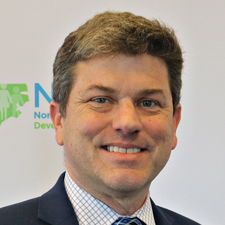December 2021 - Highlights and Hot Topics

Letter from the Executive Director
2021 comes to a close on the heels of the passing of the North Carolina (NC) budget that was passed and signed into law by Governor Roy Cooper just before Thanksgiving. It contained many important and exciting provisions for the intellectual and other developmental disabilities (I/DD) community.

The new budget includes 1,000 slots for the Innovations Waiver, funds intended to increase direct support professional pay to $15.00 an hour, and some additional funds that can be divided between Community Alternatives Program for Disabled Adults (CAP-DA), Traumatic Brain Injury (TBI), and Innovations Waivers. The General Assembly has also requested reports on the Direct Support Professionals (DSP) workforce and the potential to add another 1,000 slots in the next biennium (two-year session). You can read about these and other provisions in our Public Policy Updates.
While this is exciting, NC still has a waiting list of over 15,000 individuals waiting for services and help. That number grew by more than 1,000 in the last two years.
Next year, the state will move from (b)(3) services to 1915(i) services. (B)(3) services provide a limited array of services to a limited number of individuals with I/DD. The change to 1915(i), which is a different federal code section, will allow everyone with I/DD and Medicaid who qualifies to receive them. That said, the state is going to discontinue some services that were offered in (b)(3). All of us need to stay informed of these changes and advocate and educate.
Still more changes will take place as the state moves to Tailored Plans for individuals with I/DD on Medicaid. This is another important issue on which we need to stay informed and educated and for which we need to advocate. What will care management really be like under the Tailored Plans for individuals on the waiting list and for individuals on the Innovations Waiver? How will peers and family member peers be part of care management?
There will be many more opportunities to educate and advocate through Council initiatives, including our new four-year Registry of Unmet Needs initiative. Let's get ready to stay informed, educate, and advocate. In the meantime, let's celebrate the new year!
Talley Wells, Executive Director
Public Policy Update as of December 13

STATE UPDATE
Legislative
The General Assembly passed a state budget for the fiscal year July 2021 – June 2022, and it was signed into law by Governor Cooper on November 18. This budget includes more items related to people with I/DD than other budgets in recent history. Below are highlights:
- Home and Community-Based Services (HCBS) – Provides funding to increase slots in Innovations, CAP-DA, and TBI waiver services. Innovations will be increased by 1,000 slots.
- Adjustments to Innovations Waiver Distribution – 800 of the 1,000 Innovations slots will be distributed based on the current formula, while 200 of the 1,000 slots will be distributed to the Local Management Entities – Managed Care Organizations (LME-MCOs) based on their population.
- Plan for Adequate Provider Supply for Services Provided through the Innovations Waiver – This provision requires the Department of Health and Human Services (DHHS) to create a plan that supports adding at least 1,000 more waiver slots in 2023-2025. This plan should include ways to ensure that there would be enough providers to support additional individuals on the Innovations Waiver.
- Direct Care Worker Wages – Provides funding to increase Medicaid reimbursement rates that will increase the direct care worker/direct support professional wages for HCBS providers.
- Direct Care Workforce Bonus – Uses federal funds to pay a $2,000 bonus for eligible direct care workers/direct support professionals.
- Wage Increase for Direct Care Workers in intermediate care facilities (ICFs) – Provides funding to increase wages for direct care workers/direct support professionals who work in ICFs for people with I/DD.
- HCBS Fund – Creates a home and community-based services reserve fund to be used to expand access to community services.
- Medicaid Rebase – This funding addresses changes in Medicaid enrollment, changes in the federal match, and the move to managed care.
- Increase cap on Special Education funding – Provides funding to increase the cap on the current funding formula for children with disabilities from 12.75% to 13%.
- Children with Disabilities Reserve – Provides funds for public schools to use if the enrollment of students with special needs is more than anticipated. (However, funds cannot exceed the 13% cap.)
- Recommendations for Special Education Funding – provides funding for the Department of Public Instruction (DPI) to contract with consultants to examine the current per pupil funding and make recommendations about alternate ways to fund special education.
- Special Education Due Process Hearings – This provision will change the appeals process and allow parents to file civil cases in state or federal court following a decision by an administrative law judge. It gets rid of the special education Review Officer, which was a barrier for families.
- Community College Program for Students with I/DD – Creates a pilot program to expand career/work opportunities for students with I/DD.
- Transformation Projects – Provides funds to support the transition to Medicaid managed care.
- Temporary Assistance for ICFs/Individuals with Intellectual Disabilities – Provides one-time funding assistance for intermediate Care Facilities for I/DD.
- Group Home Temporary Funding – Short-term assistance to group homes to address the loss of funds related to Personal Care (which occurred about 10 years ago). There is still no permanent solution.
- Group Home Stabilization Funds – Funds for the development of a new rate model to address current issues with rates.
- LME-MCOs Funding – This provision allows LME-MCOs to keep $30 million in single stream funding that in recent years has been transferred to Medicaid reserves or general fund.
- Special Assistance Changes – This provision increases the personal needs allowance for Special Assistance recipients from $46 to $70 a month.
This budget is a good start in addressing priorities of the North Carolina Council on Developmental Disabilities (NCCDD) such as the wait list and Direct Support Professionals’ wages.
Thank your legislator for their support this session. We will continue to educate policymakers about how these and other changes are needed to achieve the goal of community living for all people with I/DD.
Managed Care Transformation Update
Tailored Plan implementation, which was scheduled for July 2022, has been delayed until December 2022. The delay in the state budget, along with the on-going work on Care Management and the 1915(i) benefit, played into the decision for the needed delay. Both Care Management and 1915(i) supports need to be ready at the same time as the Tailored Care launch.
Care Management, which is included as a benefit in the Tailored Plan, requires a “multidisciplinary care team to provide whole-person care management that addresses all of their needs, spanning: physical health, behavioral health, I/DD, TBI, pharmacy, long-term services and supports (LTSS) and unmet health-related resource needs.”
The DHHS has created a Tailored Care Management Technical Assistance Group (TAG) to provide input into how this service should be developed and delivered, and NCCDD has representation on this group. For more information, click here for the Tailored Care Management TAG webpage.
NC continues its work on developing a State Plan HCBS benefit. The plan is to transition the current (b)(3) services (such as community living, respite, supported employment) into 1915(i). The state is in the process of developing policies around eligibility, services provided, and any limitations. This is important because it would allow Medicaid-eligible people to access community supports without being on the Innovations Waiver.
FEDERAL
At the federal level, there have been two major funding bills that have been discussed over the past several months: Infrastructure and Build Back Better. As reported last month, Congress passed the $1.2 trillion Infrastructure bill. Key parts of the bill include:
- $39 billion to modernize public transit, upgrade aging infrastructure, and make stations accessible.
- $65 billion to ensure access to high-speed internet for all.
Congress continues to work on legislation as part of the budget reconciliation, or Build Back Better Agenda, that could greatly affect the lives of people with disabilities and their families. We have focused on the HCBS funds, which are critical. There are also many other aspects of Build Back Better (described below) which could have a positive impact for people with disabilities.
HCBS
- $150 billion over 10 years for HCBS to eliminate waiting lists for services and bolster pay for direct care workers.
- Making the Money Follows the Person program permanent to help people with disabilities who want to leave congregate care and transition to live in their own home and community with supportive services.
Education and Child Care
- $390 billion investment in universal preschool for all 3- and 4-year-olds.
- $160 million investment in Individuals with Disabilities Education Act (IDEA) Part D (legislation that ensures students with disabilities are provided with free, appropriate, tailored education) to help develop personnel working with students with disabilities.
- $25 million investment for behavioral health needs for people with I/DD.
- Families earning up to 250% of the state median income will not have to pay more than 7% of their income on childcare.
- States will need to create plans that prioritize increasing access to inclusive childcare and preschool programs for children with disabilities.
Housing
- $150 billion investment in affordable housing supports, including funding for vouchers, rental assistance, and other public housing improvements.
- The proposed funding for new vouchers is estimated to help 138,000 people with disabilities receive affordable, accessible housing.
- The proposal also includes a $100 million investment in the Section 811 and 202 programs for people with disabilities and seniors to provide rental assistance to create more supportive housing.
Paid Leave
- Four weeks of guaranteed paid and medical leave for all workers, which will help people with disabilities take time off for medical reasons and will help family members to provide care for a loved one without risk of losing their job.
Child Tax Credit
- Extending the Child Tax Credit (CTC), which provides more than 35 million households up to $3,600 per year in tax cuts per child; the proposed legislation will extend this program for the year of 2022, providing payments to nearly 90% of American children.
- The legislation includes permanent refundability for the CTC, meaning that the neediest families will continue to receive the full CTC over the long run.
Earned Income Tax Credit (EITC)
- Extending the EITC for around 17 million low-wage workers, which will help low-wage childless workers, many with disabilities, who have previously been taxed into deeper poverty.
Supplemental Security Income (SSI) Reforms
- Extend SSI to residents of Puerto Rico and other U.S. territories, which would finally eliminate a critical gap in SSI coverage and provide access to SSI for hundreds of thousands of U.S. citizens with disabilities who live in U.S. territories.
Health Care
Closes the Medicaid coverage gap for four million uninsured people by extending affordable Marketplace coverage through 2025 to low-income people in non-expansion states.
- Expands hearing and vision benefits to the traditional Medicaid program.
- Permanently reauthorizes Children's Health Insurance Program (CHIP).
- Extends continuous 12-month eligibility in Medicaid for children and adolescents.
- Extends COVID-related premiums supports and cost-sharing reductions in Affordable Care Act (ACA) Marketplace coverage through 2025, meaning more people can afford the premiums to buy coverage and have low enough cost sharing to actually use it.
Other Disability Policy Proposals
- Disability employment supports, including funding for pre-apprenticeship programs and funding to businesses and organizations that are working to phase out programs that pay people with disabilities subminimum wage.
- Administration for Community Living grants to help expand community mental and behavioral health programs.
- Funding for projects to upgrade the accessibility of public transportation services.
- $10 million for the Assistive Technology Act.
Discussion is on-going, and there is disagreement on some items, including paid leave. While there is an expressed desire to vote on this before the holidays, discussion seems to be extending into next week, which will make it difficult to get a vote through before the end of the year.
NCCDD Hosts Self-Advocate Discussion Series: January and February Sessions

NCCDD is hosting its last two webinars of the Self-Advocate Discussion Series in January and February. The virtual discussion series is facilitated by Chris Hendricks, NCCDD Policy Education Coordinator/Legislative Liaison, and NCCDD self-advocate Executive Committee member Cheryl Powell.
January 5, 1:00 p.m. - Extra Session: Why Do You Participate in the Discussion Series Sessions?
In this bonus session, attendees will describe their experiences of self-advocacy and advocating for others. Facilitators will seek volunteers from the participant attendees to briefly describe different ways of using one’s voice to advocate.
Come ready to share stories about speaking up, speaking to groups, writing and speaking to decision-makers, calling representatives, and making video messages! Register here via Zoom.
February 2, 1:00 p.m. - The Valuable Principle: Policy and Social Change Advocacy
This session is the last in the Self-Advocate Discussion Series. It will begin with policy experts relating the Valuable Principle to building and maintaining relationships with NC legislators and policymakers. Facilitators will seek volunteers from the participant attendees to briefly share knowledge on approaching decision-makers. Register here via Zoom.
The goal of the series is to prepare, organize, and mobilize NC self-advocates for influencing social and systems change. The Council aims to emphasize the value of people with disabilities to build and maintain relationships with NC legislators and decision makers.
New Council Member Spotlight: Tony Hall

NC Governor Roy Cooper has announced the appointment of Tony Hall to NCCDD.
A Raleigh resident, Hall currently works part time for The Arc of the Triangle, where he is a job coach for individuals with I/DD, providing direct support to them in their place of employment and assisting them in accomplishing specific employment and social goals.
Born with spina bifida, Hall attended Pennsylvania College of Technology in Williamsport, Pennsylvania where he earned a Bachelor of Science Degree in Web and Applications Development with minors in Business Administration and Sociology.
“I believe the best thing the Council is doing is addressing the financial needs of the disabled community through all the efforts they are making to provide employment avenues, savings/investment opportunities, and education. This is an important area to address because poverty is a massive issue for a large portion of the disabled community. Addressing this area will greatly improve the lives of these individuals and their families,” Hall said.

